Overview
Best practices for patient recruitment in clinical trials in Brazil hinge on engaging local communities, harnessing technology, and ensuring ethical compliance to bolster participation rates. This article underscores the necessity of:
- Building trust with community stakeholders
- Leveraging digital outreach
- Upholding ethical standards
These strategies are not merely suggestions; they are essential for effective recruitment, ultimately enhancing the success of clinical studies within the diverse Brazilian healthcare landscape.
Introduction
In Brazil, the success of clinical trials hinges on a critical yet often overlooked factor: patient recruitment. As the healthcare landscape becomes increasingly complex and diverse, understanding the nuances of effective recruitment strategies is paramount. With nearly 40% of clinical trials failing due to inadequate patient participation, the stakes are high.
Innovative approaches that engage local communities, leverage technology, and address cultural sensitivities are essential for overcoming barriers to enrollment. This article delves into the multifaceted challenges and opportunities within Brazil's clinical trial environment, offering insights into best practices and ethical considerations that can enhance patient recruitment efforts and ultimately drive medical advancements.
The Critical Role of Patient Recruitment in Clinical Trials
Patient enrollment is a fundamental element of clinical trial success, significantly impacting data reliability and the overall timeline of studies. In Brazil, known for its diverse and complex healthcare landscape, effective hiring strategies are paramount to achieving enrollment goals. Insufficient involvement of individuals can lead to delays, inflated costs, and ultimately, the failure to achieve important medical advancements.
Understanding the complexities of patient recruitment for clinical trials in Brazil is crucial for researchers aiming to conduct successful studies. Statistics indicate that nearly 40% of clinical trials do not succeed due to insufficient participant enrollment rates, underscoring the urgent need for creative and context-specific engagement strategies. The Brazilian healthcare system presents both challenges and opportunities; comprehending these dynamics is essential for effective strategic planning in hiring initiatives. For example, building trust with healthcare advocacy organizations can significantly enhance enrollment results.
A case study illustrates that fostering long-term relationships with these groups can alleviate concerns about exploitation and encourage participation. Jackson emphasizes the necessity for sponsors and CROs to demonstrate long-term dedication to assisting patients, rather than merely utilizing these groups for their databases. Moreover, the impact of patient enrollment extends beyond mere figures; it directly influences study results and timelines.
Implementing effective hiring strategies can yield more robust data and expedited study completion, ultimately enhancing the likelihood of regulatory approval and market entry for new medical devices. In this context, the collaboration between bioaccess™ and Caribbean Health Group to establish Barranquilla as a premier location for medical trials in Latin America exemplifies how strategic partnerships can bolster enrollment efforts. Supported by Colombia's Minister of Health, this initiative aims to streamline procedures and attract more research projects to the region.
bioaccess™ oversees various types of studies, including Early-Feasibility Studies, First-In-Human Studies, Pilot Studies, Pivotal Studies, and Post-Market Follow-Up Studies. This expertise not only facilitates effective participant sourcing but also contributes to the local economy through job creation and economic development. In Brazil, where the healthcare system is evolving, patient recruitment for clinical trials is not merely advantageous but essential for advancing clinical research and providing innovative healthcare solutions.
Additionally, various statistical techniques, such as LightGBM regression, can be utilized to analyze hiring data, offering insights into effective strategies. For instance, LightGBM regression achieved a mean validation RMSE of 20.53, highlighting the significance of data-driven methods in understanding participant enrollment dynamics. Culturally sensitive recruitment strategies, such as home visits, have demonstrated greater appeal to Hispanic and non-white individuals compared to their non-Hispanic and white counterparts, emphasizing the necessity for tailored approaches in recruitment efforts.
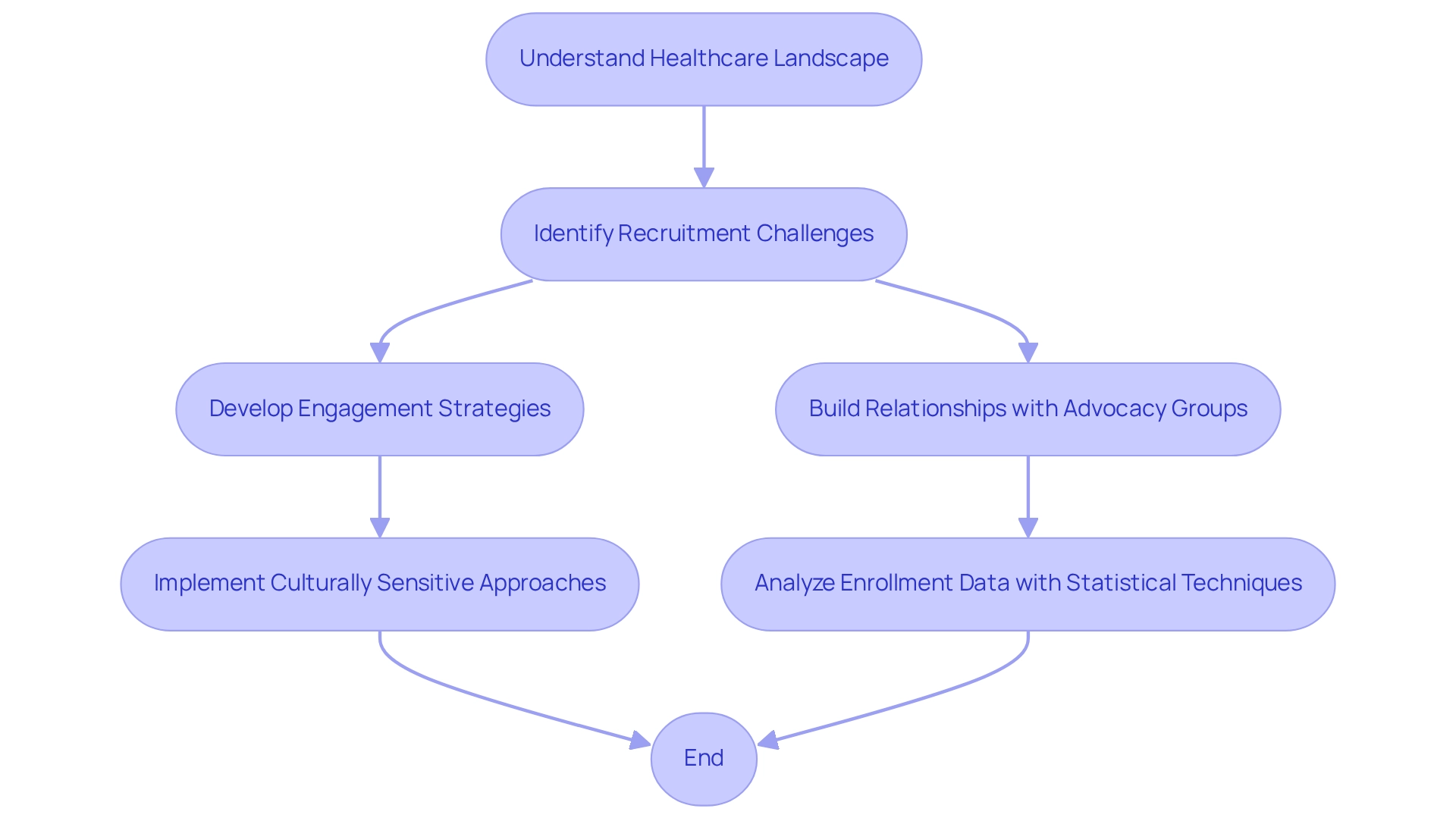
Challenges in Patient Recruitment in Brazil
The process of patient recruitment for clinical trials in Brazil involves navigating a landscape marked by distinct challenges that require tailored strategies. Key factors include:
-
Cultural and Linguistic Barriers: Brazil's rich tapestry of cultures is mirrored in its linguistic diversity, with over 200 languages spoken nationwide. This complexity can impede effective communication and understanding of study protocols, making it imperative for research teams to utilize multilingual staff and culturally sensitive materials to enhance comprehension. The historical immigration of approximately 1.5 million Italians to Brazil until World War II exemplifies the cultural diversity impacting patient recruitment, necessitating a nuanced approach to communication.
-
Socioeconomic Factors: Economic disparities significantly influence participation in studies. Many potential participants face financial hurdles, such as transportation costs and the necessity to take time off work, which may discourage them from enrolling in studies. Addressing these challenges through compensation for travel and flexible scheduling is crucial for enhancing participation rates in clinical trials in Brazil.
-
Awareness and Education: A widespread lack of understanding regarding research studies leads to misconceptions and hesitance among the general populace. Educational initiatives that inform communities about the benefits and safety of participating in clinical research are vital for successful patient recruitment in Brazil.
-
Regulatory Hurdles: The Brazilian regulatory environment can pose challenges, with lengthy approval processes potentially delaying the initiation of studies. Familiarity with these regulations and proactive planning can help mitigate their impact on patient recruitment.
-
Competition for Participants: The increasing number of concurrent studies generates competition for the same pool of individuals. Forming strategic partnerships with local healthcare providers and community organizations can broaden outreach and attract a diverse participant base, essential for successful patient recruitment in Brazil.
To effectively tackle these challenges, a multifaceted approach that respects and engages with local communities is essential. For instance, the cultural exchange stemming from historical immigration patterns, such as the arrival of Japanese martial artist Mitsuyo Maeda, illustrates how understanding cultural nuances can lead to successful outcomes. This case study underscores the importance of cultural awareness in building trust and engagement in research studies, ultimately fostering the advancement of medical devices and enhancing care for individuals in Brazil.
Furthermore, with over 20 years of experience in Medtech, bioaccess® is committed to accelerating the development of medical devices through its expertise in managing Early-Feasibility Studies, First-In-Human Studies, Pilot Studies, Pivotal Studies, and Post-Market Clinical Follow-Up Studies. Their customized approach reinforces their dedication to overcoming these recruitment challenges.
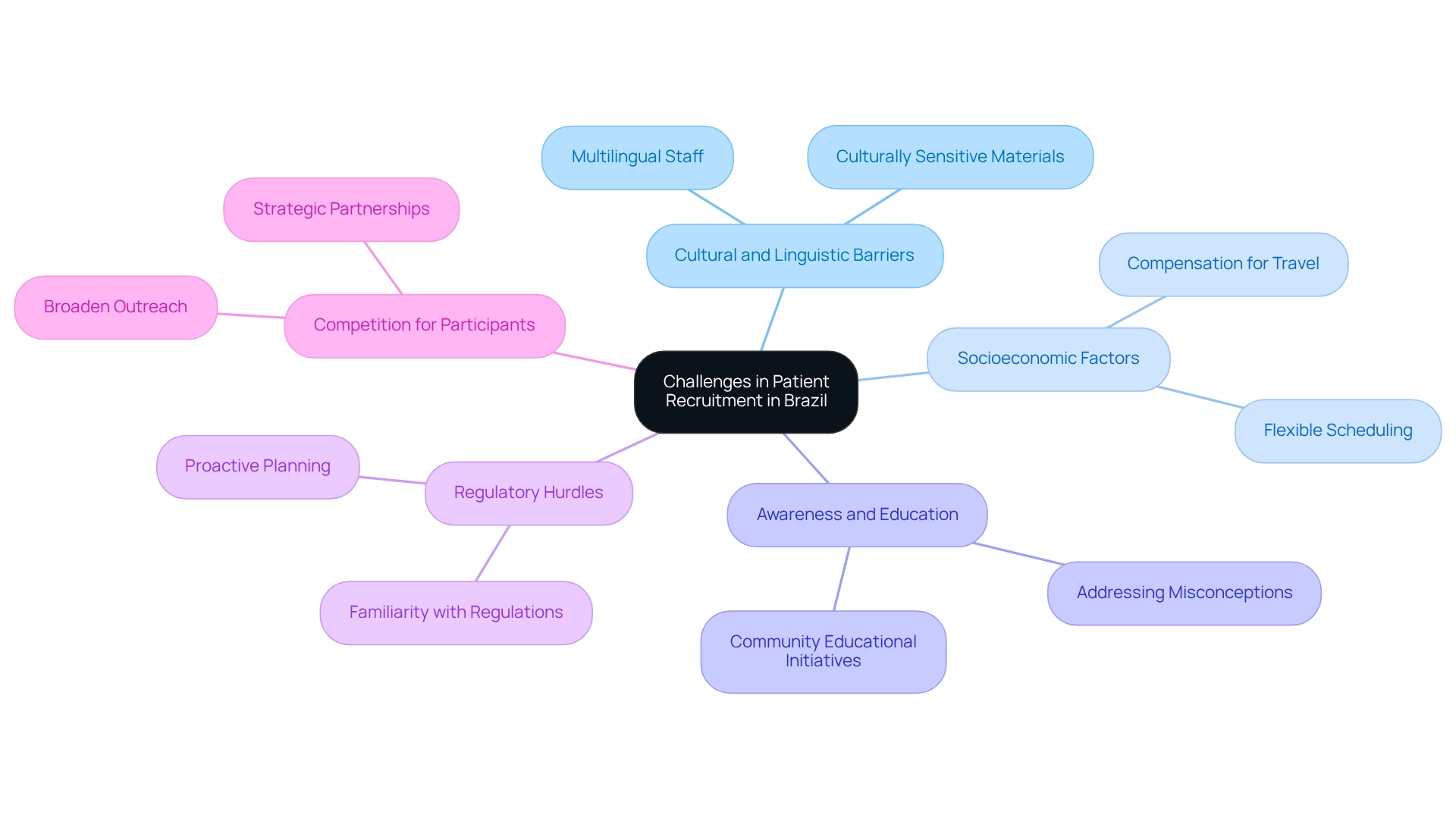
Effective Strategies for Enhancing Patient Recruitment
To improve patient enrollment in research studies in Brazil, researchers can employ several effective strategies:
-
Community Engagement: Establishing strong relationships with local communities and healthcare providers is essential for fostering trust and increasing awareness of clinical trials. Engaging community leaders not only helps disseminate information but also encourages participation by leveraging their influence and credibility within the community. Moreover, involving varied viewpoints and promoting cooperative alliances can maintain ethical standards in research, guaranteeing that enrollment efforts are both effective and responsible.
-
Tailored Communication: Creating culturally sensitive hiring materials that resonate with the target population is crucial. Research shows that customized communication can greatly influence hiring success, as it enhances comprehension and engagement in studies. Utilizing local languages and addressing specific community concerns ensures that the messaging is relevant and relatable. For instance, statistics show that the smallest study included 13 rural participants, highlighting the importance of targeted communication strategies in reaching diverse populations.
-
Utilizing Digital Platforms: The rise of digital technology offers new avenues for outreach. Leveraging social media and online patient registries can broaden recruitment efforts and connect with potential participants more effectively. Digital campaigns can be designed to target specific demographics, enhancing visibility and engagement among diverse populations.
-
Incentives for Participation: Providing incentives, such as transportation support or payment for time, can reduce some of the financial pressures related to participation in the study. This method not only promotes involvement but also shows a dedication to assisting participants throughout the process.
-
Education and Awareness Campaigns: Conducting informative sessions about the advantages and safety of research studies can help clarify the process. By offering clear and accessible information, researchers can motivate more individuals to think about involvement, ultimately resulting in increased enrollment rates. Significantly, effective community involvement efforts have demonstrated that patient recruitment for clinical trials in Brazil, by emphasizing diversity, equity, and inclusion, can lead to improved health outcomes and fairer access to treatments. As McMahon observed, community partners offer guidance of substantial importance concerning enhancing participant engagement and retention.
Applying these strategies can notably boost enrollment rates and guarantee that studies are sufficiently designed to yield dependable outcomes. Moreover, leadership support is considered crucial for maintaining research initiatives in health centers, with almost 50% of centers having their chief medical officer supervise research activities, further highlighting the necessity for institutional support in hiring strategies.
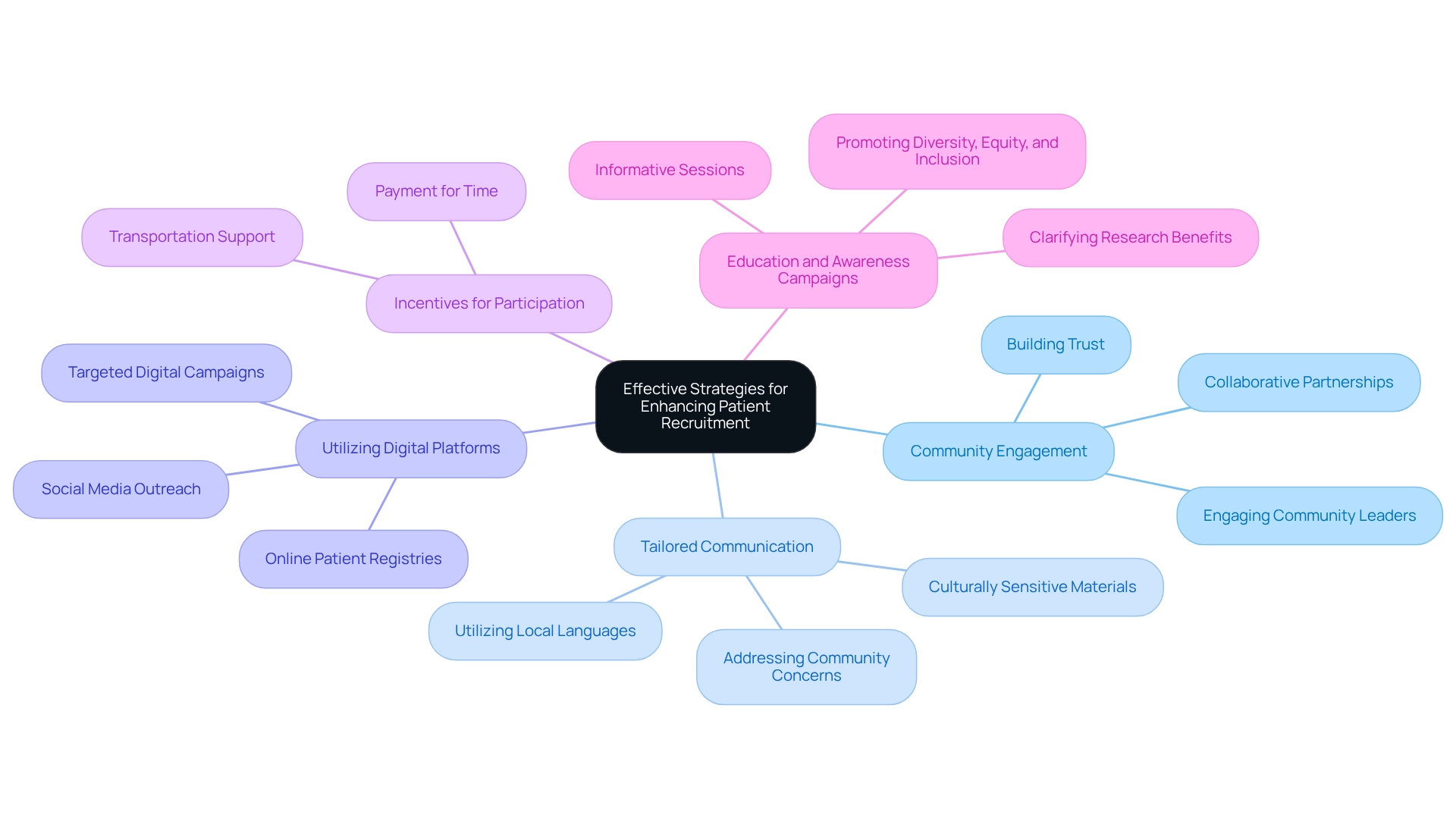
Leveraging Technology to Improve Patient Recruitment
Technology plays a pivotal role in enhancing participant enrollment in clinical trials, with several key advancements making a significant impact.
-
Electronic Health Records (EHRs) are instrumental, enabling researchers to efficiently identify qualified individuals through extensive databases tailored to specific criteria. This capability addresses the prevalent issue of overestimating the number of qualified candidates, frequently cited as a primary reason for recruitment failure. Furthermore, EHRs can be categorized into EHR-supported studies and EHR-evaluating studies, with the majority currently focusing on the assessment of EHR technology.
-
Telemedicine has also emerged as a transformative force; the rise in virtual consultations allows for initial screenings and follow-ups to be conducted remotely, significantly improving accessibility for individuals who may face challenges in traveling to research sites. This approach not only broadens the participant pool but also enhances comfort and convenience for those involved.
-
Additionally, Mobile Applications dedicated to clinical studies provide patients with essential information and encourage them to express interest. These platforms foster engagement by making trial information readily accessible and user-friendly.
-
Data Analytics tools empower researchers to identify trends and refine recruitment strategies. By analyzing participant demographics and previous enrollment efforts, researchers can tailor their approaches to better meet the needs of potential participants.
-
Moreover, Social Media Campaigns leveraging targeted advertising on social platforms enable researchers to effectively reach specific populations. By raising awareness and engagement in research studies through these channels, enrollment efforts can be significantly bolstered.
A study conducted in British Columbia involving 28 physicians and 23,976 elderly individuals underscores the effectiveness of EHRs in research. However, challenges persist in utilizing EHR data, including non-research-friendly formats and incomplete information. Overcoming these obstacles through innovative techniques such as Natural Language Processing (NLP) can enhance the reliability of EHR data in participant enrollment.
By embracing these technological innovations, researchers can refine their strategies for patient recruitment in clinical trials in Brazil, making them more efficient and effective in engaging potential candidates.
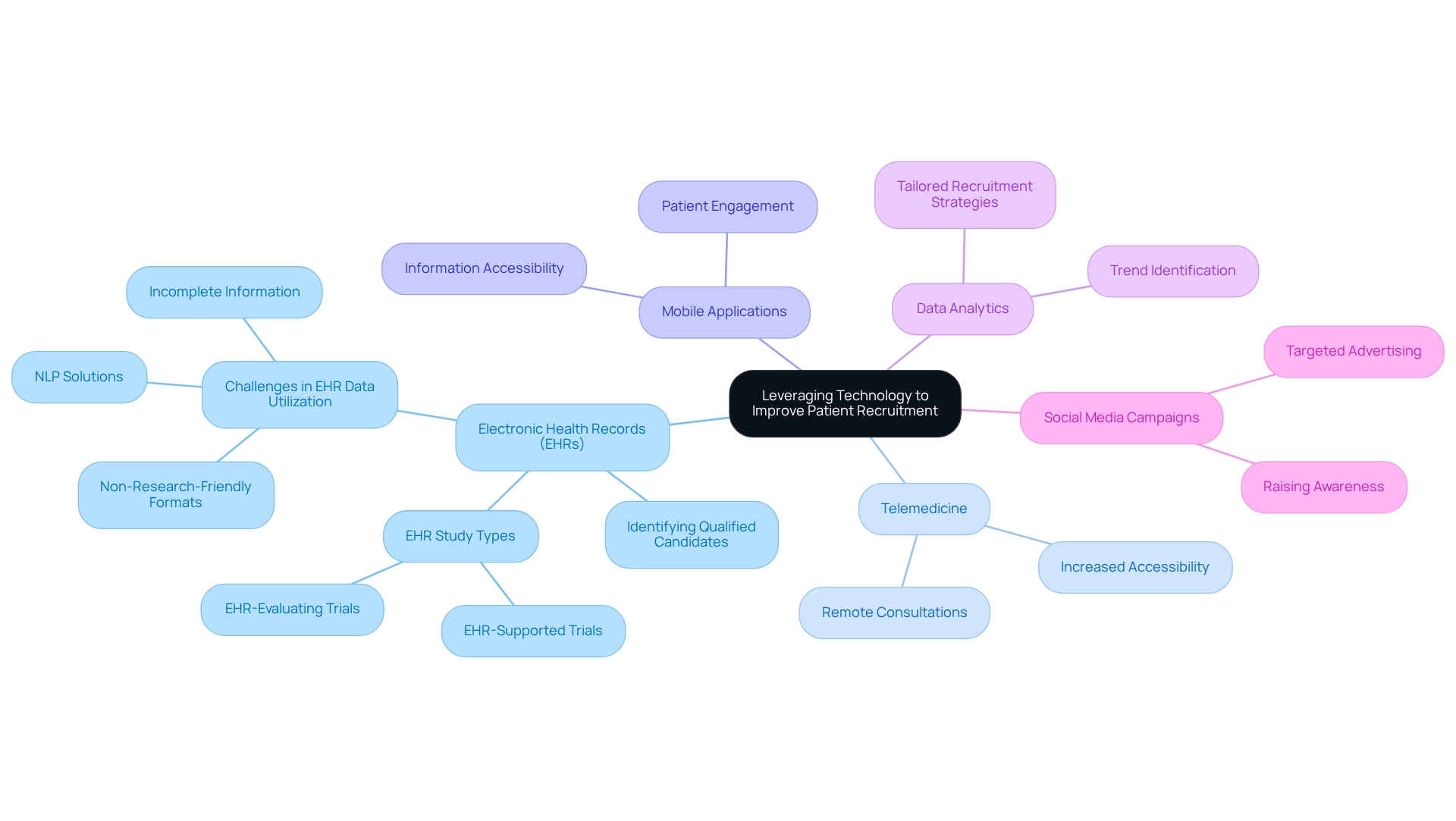
Ethical Considerations in Patient Recruitment
Ethical considerations are paramount in patient recruitment for clinical trials in Brazil, ensuring that the rights and welfare of participants are prioritized. The key ethical principles include:
-
Informed Consent: It is essential that potential participants fully comprehend the study's purpose, procedures, risks, and benefits. Providing clear, accessible information is crucial to facilitate informed decision-making. Recent analyses indicate significant variability in informed consent comprehension among participants, influenced by factors such as cancer status and national development status. This highlights the necessity for tailored communication strategies that enhance understanding across diverse populations.
Notably, only 6% of research staff utilized multimedia resources, underscoring an opportunity to improve communication methods in this area.
-
Respect for Autonomy: Participants must have the freedom to make informed choices regarding their participation in studies, free from coercion or undue influence. This respect for autonomy is vital in fostering a sense of agency among participants, which can positively impact patient recruitment for clinical trials in Brazil.
Equity in recruitment is crucial; recruitment strategies should aim to incorporate varied populations to ensure that all demographic groups have equal chances in patient recruitment for clinical trials in Brazil. This approach not only enhances the generalizability of study outcomes but also addresses disparities in healthcare access. As highlighted by Paula Aristizabal, culturally, linguistically, and health literacy–concordant interventions can significantly improve informed consent comprehension and decision-making, which is essential for effective patient recruitment for clinical trials in Brazil, ensuring more equitable research participation.
-
Confidentiality: Safeguarding the privacy of participants and managing their data responsibly is critical for maintaining trust and adhering to ethical standards. Effective data handling practices are essential, particularly given the sensitive nature of health information. At bioaccess®, we are committed to ensuring information security and client trust through our robust data protection procedures, which include secure data storage, limited access to sensitive information, and regular audits to ensure compliance with data protection regulations.
If participants have any queries or concerns regarding the processing of their information, they can reach out to our Grievance Officer, ensuring that their concerns are addressed with compliance and transparency.
-
Monitoring and Oversight: Ongoing ethical supervision by Institutional Review Boards (IRBs) is essential to guarantee that participant selection methods adhere to ethical standards during the study. This oversight aids in recognizing and addressing potential ethical concerns as they arise.
By adhering to these ethical principles, researchers can enhance trust and integrity in their hiring practices, which is essential for patient recruitment for clinical trials in Brazil, ultimately improving the success and credibility of the trials. For instance, a case study conducted during the COVID-19 pandemic in Ireland and the UK demonstrated the effectiveness of using privacy-conscious methods to gather data from participants, ensuring ethical compliance while minimizing biases. This study utilized convenience sampling to engage 200 existing research participants, showcasing a practical application of ethical hiring strategies.
Such practices can serve as a model for ethical hiring strategies in Brazil and beyond.
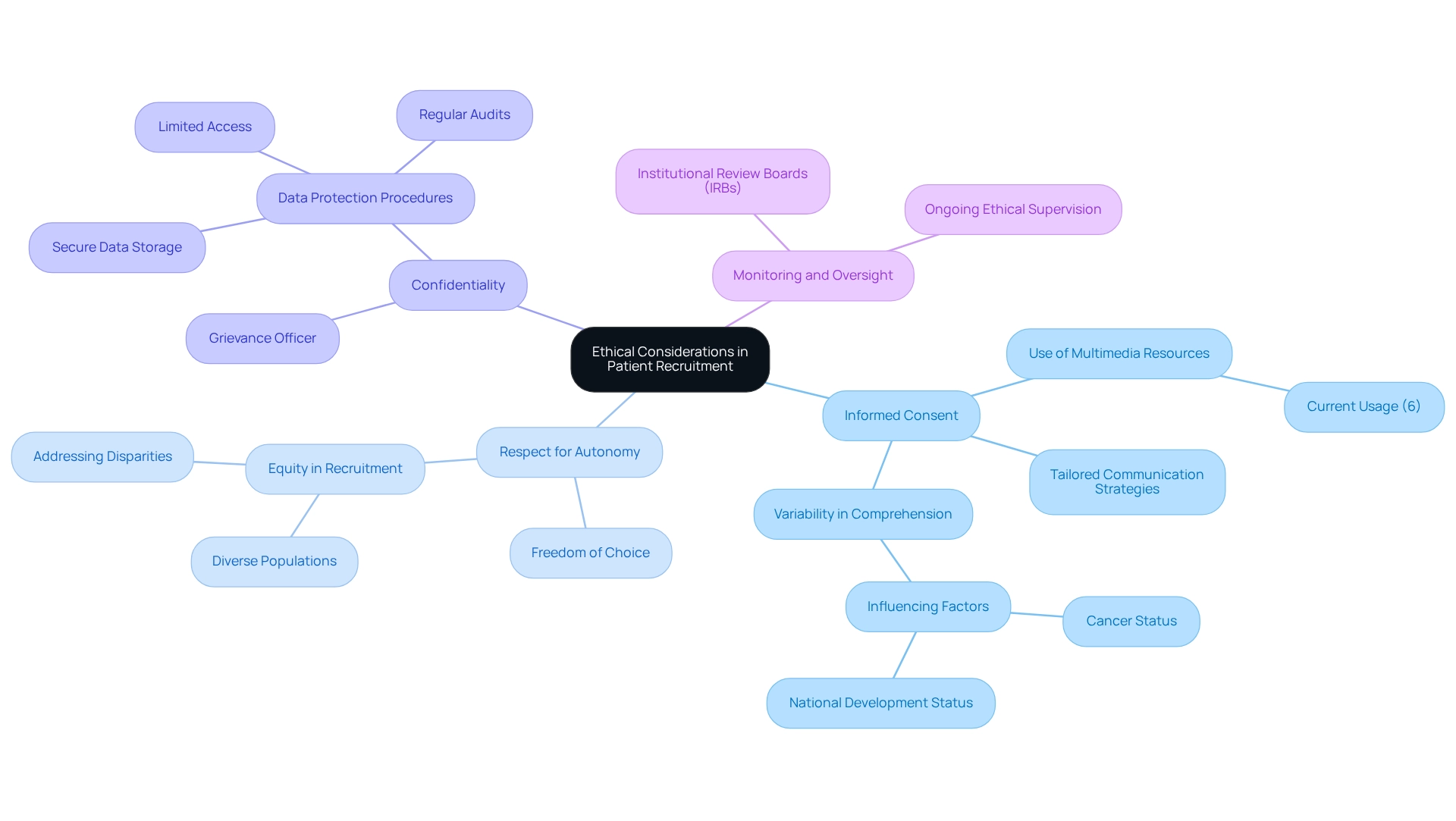
Navigating the Regulatory Landscape for Patient Recruitment in Brazil
Navigating the regulatory landscape for patient recruitment for clinical trials in Brazil necessitates a thorough understanding of the key regulations and guidelines established by ANVISA (Agência Nacional de Vigilância Sanitária). Several critical considerations must be addressed:
-
Approval Processes: Before initiating participant enrollment, researchers are required to secure necessary approvals, which include ethical review and regulatory submissions. This step is crucial to ensure that all aspects of the study align with ethical standards and regulatory requirements.
-
Compliance with Local Laws: Adhering to Brazilian laws regarding patient rights, informed consent, and data protection is essential. This compliance not only safeguards participants but also reinforces the integrity of the research process.
-
Documentation Requirements: Maintaining comprehensive documentation of hiring efforts, consent forms, and participant information is vital for regulatory compliance and audit readiness. This meticulous record-keeping demonstrates adherence to protocols and facilitates smoother interactions with regulatory bodies.
-
Engagement with Regulatory Bodies: Establishing proactive communication with regulatory authorities can significantly streamline approval processes. Interacting with these organizations provides researchers with valuable insights into optimal methods for attracting participants and clarifies any regulatory uncertainties. Notably, committee members of CNERS are appointed for three years and must have no conflict of interest with the protocols under review, underscoring the importance of governance in regulatory engagement.
-
Updates on Regulatory Changes: Staying informed about evolving regulations, such as the recent Law 14.874/24, which aims to simplify clinical trial processes, is crucial. Modifying hiring strategies in response to these changes can enhance efficiency and compliance. Additionally, it is important to note that the sponsor must submit the research protocol in Portuguese to the CEP/CONEP System, emphasizing the significance of language in regulatory processes.
By skillfully maneuvering through the regulatory environment, researchers can enhance patient recruitment for clinical trials in Brazil while ensuring compliance with legal and ethical standards. As Christopher Holstege noted, "Medical surveillance involves performing observational studies of individuals or populations and includes the collection, collation, analysis, and dissemination of data in an effort to identify conditions or factors that pose an increased risk of adverse health effects." This perspective highlights the critical role of observational studies in the context of patient recruitment for clinical trials in Brazil and ensuring regulatory compliance.
Ultimately, these efforts contribute to the success of medical studies in Brazil, particularly in the context of patient recruitment for clinical trials, as demonstrated by the challenges faced by local pharmaceutical firms in the case study titled 'Comparative Analysis of Analytical Method Validation,' which emphasizes the necessity for alignment with international guidelines to simplify the approval process.
In this context, bioaccess provides extensive management services for studies, including feasibility assessments, site selection, compliance evaluations, setup, import permits, project management, and reporting, ensuring that researchers are well-equipped to navigate these complexities. Additionally, experts like Katherine Ruiz, who specializes in Regulatory Affairs for medical devices and in vitro diagnostics in Colombia, and Ana Criado, Director of Regulatory Affairs and CEO of Mahu Pharma, offer invaluable insights that enhance the effectiveness of these services.
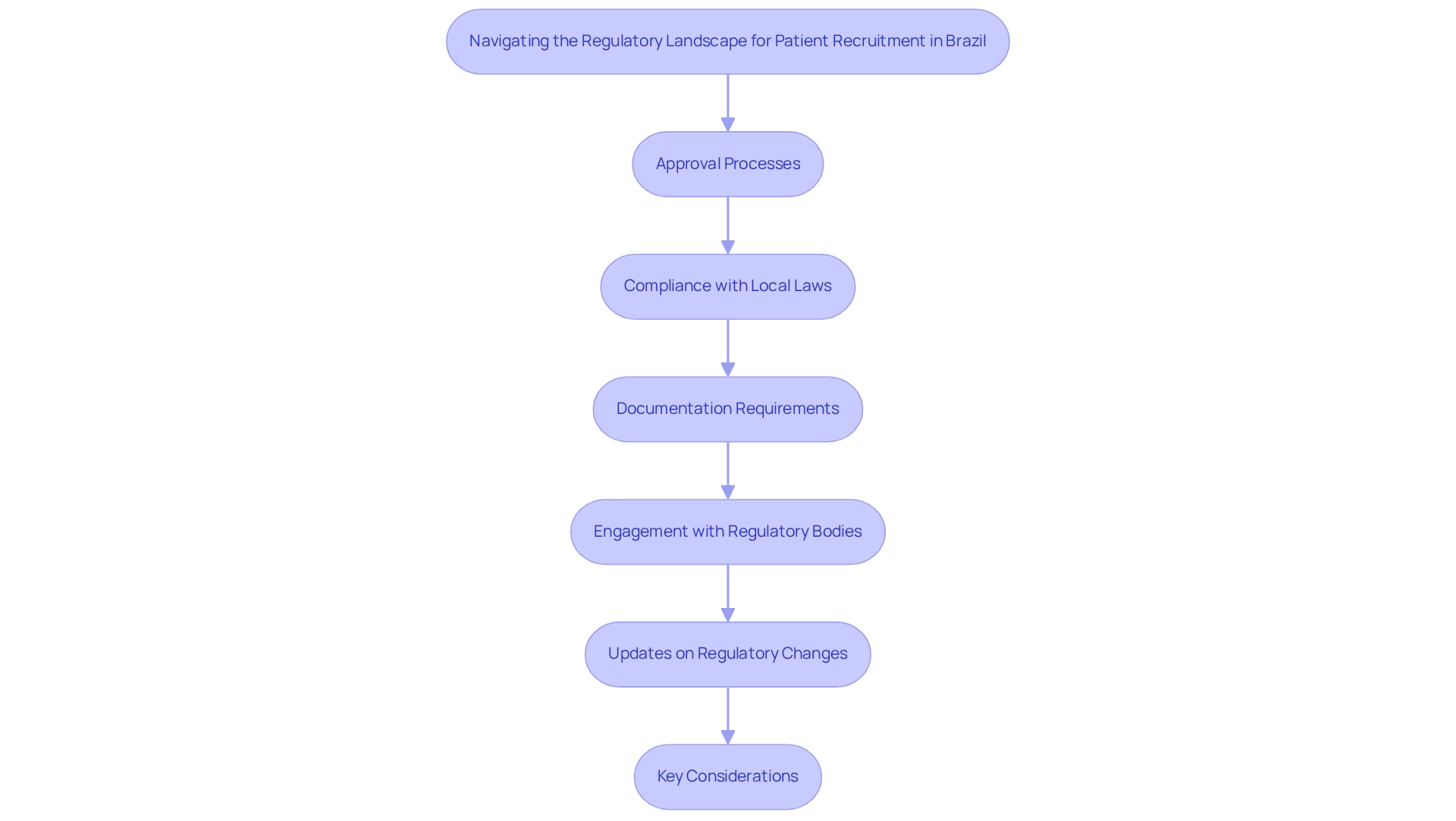
Best Practices for Successful Patient Recruitment in Brazil
Successful patient recruitment in clinical trials in Brazil hinges on several best practices that can significantly enhance engagement and retention rates.
- Engage with Local Communities: Establishing trust and awareness is crucial. Collaborations with nearby healthcare providers and community groups cultivate a supportive atmosphere for potential participants, thereby enhancing the chances of success in attracting them. This approach is exemplified by bioaccess's collaboration with Caribbean Health Group, which aims to position Barranquilla as a leading destination for clinical trials in Latin America, supported by Colombia's Minister of Health.
- Utilize Technology: Embracing digital tools and platforms can streamline hiring processes. Online outreach not only expands the reach but also enables simpler communication with potential participants, making the hiring process more efficient.
- Tailor Communication: Crafting culturally sensitive materials is essential. Communication should resonate with the target population, ensuring that information is clear and accessible. This approach helps in addressing any concerns and encourages participation.
- Address Ethical Considerations: Upholding ethical standards is paramount. Researchers must ensure informed consent and respect for participant autonomy, which builds trust and encourages involvement in studies.
- Stay Informed on Regulations: Keeping abreast of regulatory changes is vital for compliance. Grasping the changing environment of research regulations in Brazil can ease smoother participant sourcing and improve the study's credibility.
- Collaborate with Stakeholders: The participation of different stakeholders is essential in clinical trial enrollment. Collaborative strategies improve the effectiveness of hiring efforts, as illustrated in case studies. Establishing connections among stakeholders results in more effective and efficient hiring strategies, akin to the successful initiatives carried out by bioaccess in collaboration with local health institutions.
- Maintain Flexibility: Embracing a versatile approach enables the adjustment of hiring strategies to address the requirements of various studies, ensuring that researchers can respond to distinct challenges as they emerge.
Applying these strategies can result in enhanced hiring outcomes. Significantly, a systematic review revealed that only 55% of studies achieved their initially defined enrollment objectives, highlighting the necessity for efficient strategies. Additionally, as Antoni Torres observed, "Participant enlistment is one of the most difficult facets of a research study, directly affecting both the study’s length and the quality of its outcomes."
By focusing on community outreach and engagement, along with collaboration among stakeholders, researchers can significantly improve patient recruitment for clinical trials in Brazil, ultimately leading to more successful outcomes.
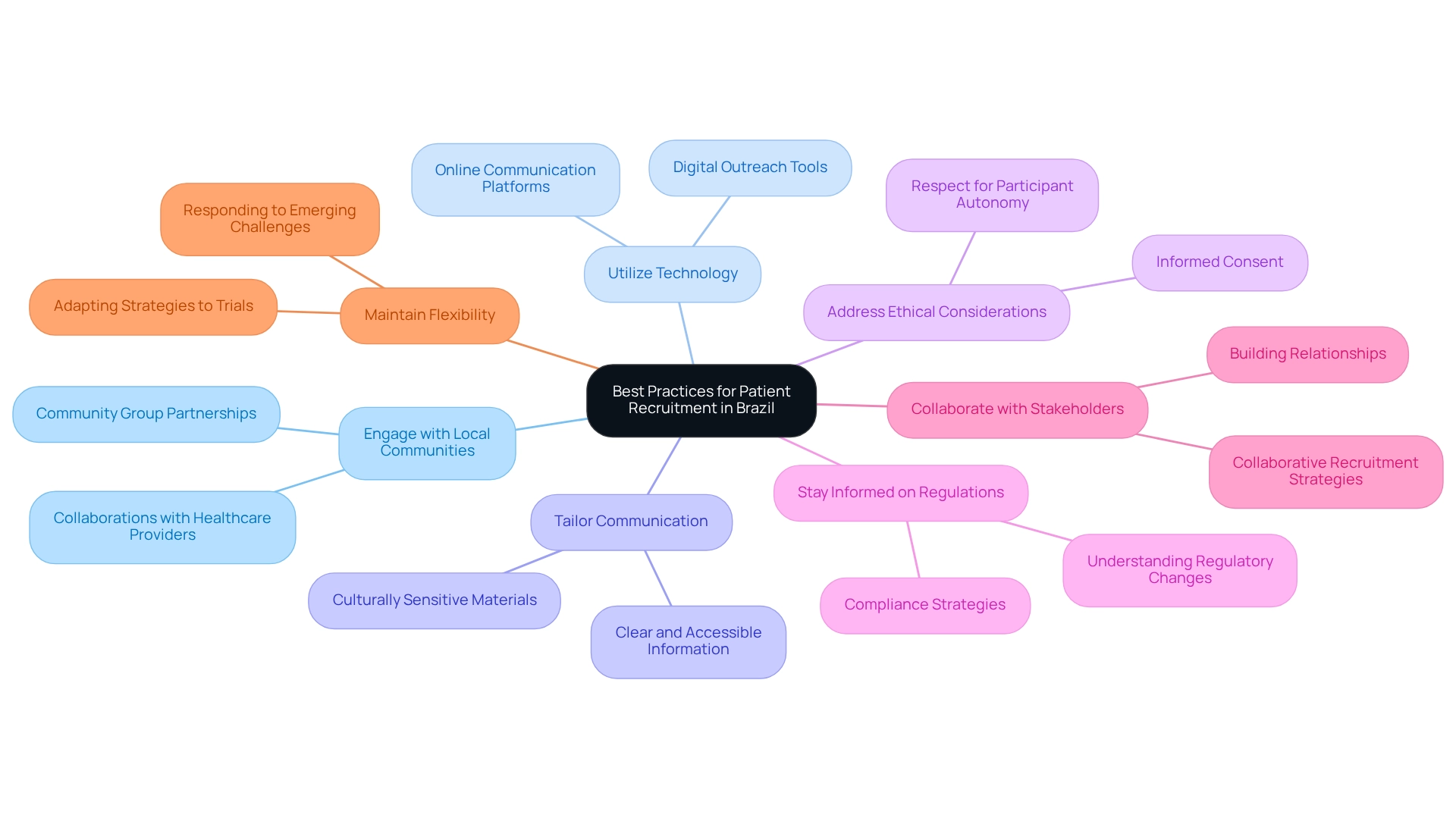
Conclusion
Patient recruitment is a cornerstone of successful clinical trials in Brazil, where the complexities of the healthcare landscape present both challenges and opportunities. Nearly 40% of clinical trials fail due to inadequate recruitment, underscoring the urgent need for innovative and culturally sensitive strategies. By fostering trust within local communities, utilizing technology, and addressing socioeconomic barriers, researchers can significantly enhance participation rates.
Moreover, ethical considerations are pivotal in recruitment efforts. Ensuring informed consent and respecting participants' autonomy fosters trust and encourages involvement in trials. Navigating the regulatory landscape further highlights the importance of compliance and proactive engagement with regulatory bodies to streamline recruitment processes.
Adopting best practices, such as community engagement, tailored communication, and leveraging digital platforms, can lead to improved recruitment outcomes. As demonstrated through various case studies, collaboration among stakeholders and flexibility in approach are essential for overcoming recruitment challenges.
Ultimately, effective patient recruitment transcends mere logistical hurdles; it is integral to advancing medical research and improving healthcare delivery. By prioritizing these strategies, researchers can pave the way for successful clinical trials that contribute to significant medical advancements in Brazil and beyond.
Frequently Asked Questions
Why is patient enrollment important in clinical trials?
Patient enrollment is fundamental to clinical trial success as it significantly impacts data reliability and the overall timeline of studies. Insufficient enrollment can lead to delays, inflated costs, and the failure to achieve important medical advancements.
What challenges does Brazil's healthcare system present for patient recruitment?
Brazil's healthcare system presents challenges such as cultural and linguistic barriers, socioeconomic factors, a lack of awareness and education about clinical trials, regulatory hurdles, and competition for participants among concurrent studies.
What strategies can enhance patient enrollment in Brazil?
Effective strategies include building trust with healthcare advocacy organizations, utilizing multilingual staff, providing compensation for travel, offering flexible scheduling, and conducting educational initiatives to inform communities about clinical research.
How does cultural diversity affect patient recruitment in Brazil?
Brazil's cultural diversity, which includes over 200 languages, can impede communication and understanding of study protocols. Culturally sensitive recruitment strategies and multilingual materials are essential to improve comprehension and engagement.
What role do socioeconomic factors play in patient recruitment?
Economic disparities can discourage participation in studies due to financial hurdles, such as transportation costs and the need to take time off work. Addressing these challenges through compensation and flexible scheduling is crucial for enhancing participation rates.
How can awareness and education improve patient enrollment?
Educational initiatives that inform communities about the benefits and safety of participating in clinical research can help dispel misconceptions and increase willingness to enroll in studies.
What impact do regulatory hurdles have on clinical trials in Brazil?
The Brazilian regulatory environment can pose challenges with lengthy approval processes that may delay the initiation of studies. Familiarity with these regulations and proactive planning can help mitigate their impact on patient recruitment.
How can competition for participants be addressed?
Forming strategic partnerships with local healthcare providers and community organizations can broaden outreach efforts and attract a diverse participant base, which is essential for successful recruitment.
What is the significance of data-driven methods in patient recruitment?
Utilizing statistical techniques, such as LightGBM regression, can provide insights into effective hiring strategies and improve understanding of participant enrollment dynamics.
How does bioaccess™ contribute to patient recruitment in Brazil?
bioaccess™ leverages over 20 years of experience in Medtech to manage various types of studies and employs a customized approach to overcome recruitment challenges, thereby enhancing the likelihood of successful clinical trials.

